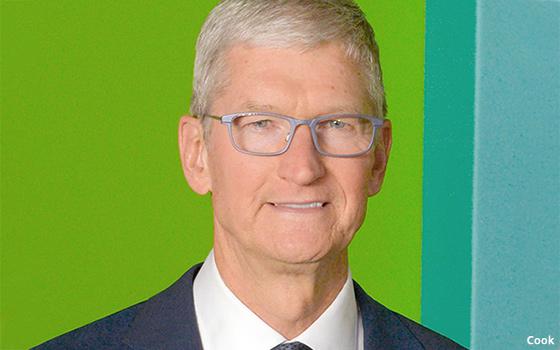Tim Cook Defends App Store Policies
- by Wendy Davis @wendyndavis, May 24, 2021
Apple CEO Tim Cook on Friday defended the company's tight App Store policies, telling a federal judge that the company's rules for apps benefit consumers as well as developers.
At the start of his four-hour long testimony, Cook told U.S. District Court Judge Yvonne Gonzalez Rogers in Oakland that the App Store policies boost privacy and safety for iPhone and iPad users.
“Privacy from our point of view is one of the most important issues of the century,” he testified.
He added that privacy is built on “safety and security,” and that the app marketplace “would become a toxic kind of mess” if the company didn't vet apps.
Cook also said developers benefit from Apple's policies, because developers rely on “the store being a safe and trusted place.”
His remarks came on the last day of trial testimony in an antitrust lawsuit filed against Apple by Epic Games.
Epic brought the case last August, after Apple removed the Fortnite game from the iOS app store. Apple did so after Epic began offering gamers the ability to make purchases directly from it, instead of through Apple's platform.
Apple requires game developers to use its payment platform for in-app purchases, and charges a 30% commission to developers that take in more than $1 million in revenue. Smaller developers pay only a 15% commission. Before removing Fortnite from the app platform, Apple garnered more than $100 million from the game, Apple executive Michael Schmid testified last week.
Epic contends Apple monopolizes the iOS app distribution market, and unlawfully forces developers to use its payment processing system.
Before Cook left the witness stand, Gonzalez Rogers herself questioned him about the company's requirement that in-app purchases go through Apple's payment platform.
“What is the problem with allowing users to have choice, especially in a gaming context, to have a cheaper option for content,” the judge asked Cook.
He answered that people “have a choice between many different Android models” or an iPhone, adding that the iPhone “has a certain set of principles behind it” regarding safety, security and privacy.
When Gonzalez Rogers pressed the Apple CEO on why the company wouldn't let consumers make in-game purchases outside its platform, he replied: “If we allowed people to link out like that, we would in essence give up our total return on our IP.”
The judge said it seemed the gaming apps were “generating a disproportionate amount of money,” for Apple, and may be subsidizing the free apps.
Cook responded that most apps on the App Store are free, but that those free apps increase traffic to the store, which gives other developers a larger audience to monetize.
Epic isn't the first one to accuse Apple of violating antitrust laws.
Two years ago, the Supreme Court revived a lawsuit by a group of consumers who alleged that Apple monopolizes app distribution for iPhones. The consumers argued that Apple's commission from developers gets passed on to app users.
That matter is pending in front of Gonzalez Rogers.
Regulators in Europe are also examining whether Apple's app store policies are anticompetitive.
Separately, the Interactive Advertising Bureau France and other business groups brought an antitrust complaint against Apple in Europe over new privacy settings that prohibit developers from tracking iPhone users without their explicit permission.
In March, authorities in Europe allowed Apple to move forward with the privacy controls.
Gonzalez Rogers is expected to decide later this year whether Epic proved its claims against Apple.



